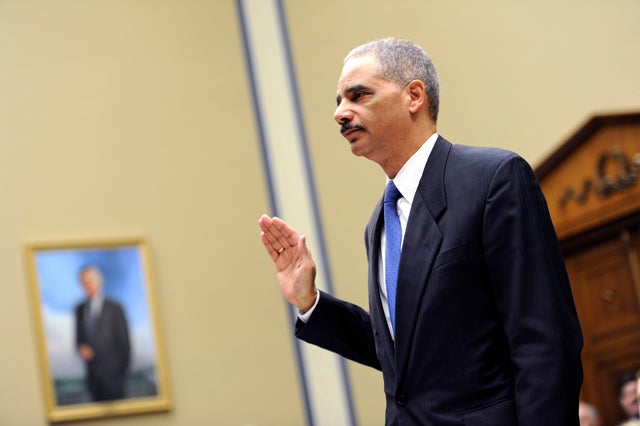Calls for Gun Control in Wake of Fast and Furious Ignore Current Law
Lachlan Markay /
Attorney General Eric Holder used his testimony before a House committee on Thursday to tout the supposed need for new gun control laws to prevent “gun walking,” or the transportation of firearms across the Southern border. But he – and members of the committee – ignored existing laws that already accomplish Holder’s ostensible goals.
“That is why we need a stronger gun trafficking law,” Holder said in response to questions about recourse against officials who signed off on the gun walking tactic. The tactic was integral to Operation Fast and Furious, which allowed the transportation of roughly 2,500 firearms into Mexico, often with not just the knowledge but the facilitation of federal law enforcement officials, where those guns were given to violent drug cartels.
Many Democrats on the House Oversight and Government Reform Committee, where Holder was testifying for the sixth time on Fast and Furious, echoed the attorney general’s calls for greater gun control. Reps. Elijah Cummings (D-MD) and Carolyn Maloney (D-NY) touted legislation they introduced, which would make suspected “straw purchases” – the purchases of guns to be handed off to others – illegal.
Holder called that bill “a good place for us to start.”
But neither Holder nor committee members mentioned the International Emergency Economic Powers Act, a federal law already on the books that appears to criminalize the precise conduct undertaken by the Bureau of Alcohol, Tobacco, Firearms and Explosives (ATF) in Operation Fast and Furious.
According to James Steinbauer, a former Senate Intelligence Committee staffer who wrote the Kingpin Act, an extension of the IEEPA, “it is illegal for any U.S. entity or individual to aid, abet, or materially assist — or in the case of Operation Fast and Furious, to facilitate others to aid, abet, or materially assist — designated drug traffickers.”
Steinbauer detailed some of the law’s intricacies at Pajamas Media in December:
Based on the July 5, 2010, memo to Eric Holder, it would appear that Fast and Furious facilitated the delivery of weapons to — at a minimum — the Sinaloa cartel in Mexico. The U.S. Department of the Treasury, which administers both the IEEPA and Kingpin Act programs, has designated numerous members of the Sinaloa cartel under both programs. IEEPA prohibitions apply to the U.S. government as well as to individuals, and as stated there are no exceptions within IEEPA programs for unlicensed U.S. law enforcement or intelligence agency operations.
There is a provision in the Kingpin Act for “authorized” law enforcement and intelligence activities, however the only procedure by which an Operation Fast and Furious program could have been “authorized” under the Kingpin Act was by the U.S. attorney general requesting a waiver (known within the Treasury Department as a Specific License), prior to any such operation being undertaken.
But Holder has repeatedly insisted – and emphasized again today – that he was not aware that gun walking tactics were in use at the time. Simply, he could not have requested a waiver allowing the ATF to walk guns without knowing that the ATF was walking guns.
So laws designed to deter the type of gun walking seen in Operation Fast and Furious – and to punish those who permit it – are already on the books. Additional laws aimed at gun trafficking are therefore unnecessary, assuming, of course, that their purpose is not gun control unrelated to the scandal at issue, but rather to prevent the type of activities that the ATF engaged in, which led to the deaths of Border Patrol Agent Brian Terry, Immigration and Customs Enforcement Agent Jaime Zapata, and potentially hundreds of Mexican citizens.

